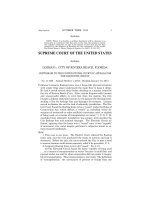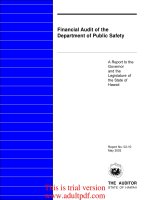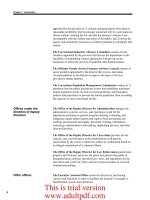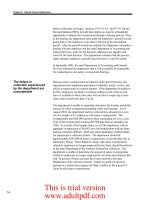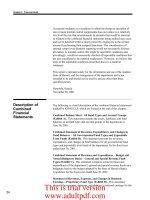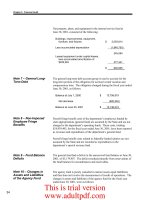Report to the Congress FINANCIAL AUDIT 1997 Consolidated Financial Statements of the United States Government_part4 ppt
Bạn đang xem bản rút gọn của tài liệu. Xem và tải ngay bản đầy đủ của tài liệu tại đây (54.23 KB, 10 trang )
In the past year, we have issued over 20 reports outlining actions underway in a wide
range of federal activities to address this challenge and providing numerous
recommendations for additional improvements needed. Moreover, the President recently
created a Council on Year 2000 Conversion, led by an Assistant to the President, to
oversee federal agencies’ Year 2000 efforts, speak for the United States in national and
international forums, and coordinate with governments at all levels, as well as with the
private sector. While some progress has occurred, a great deal of additional effort is
required to prevent serious disruptions in government operations and in financial
transactions and reporting.
7
We will continue to monitor this situation and make needed
recommendations.
FINANCIAL STATEMENT AND BUDGET DECISIONS:
ADDING THE LONG-TERM PERSPECTIVE
When the government is able to produce them, reliable consolidated financial statements
will be a valuable tool for analyzing the government’s financial condition. They will also
help inform budget deliberations by providing additional information beyond that
provided in the budget on the long-term cost implications for a wide range of government
programs. The largely cash-based budget and the financial statements offer different
perspectives which, when combined, can provide a fuller view of the costs of agency
programs and of the government’s commitments.
A view of the long-term sustainability of fiscal policies can also be helpful to
decisionmakers considering the government’s financial position and making decisions
about resource allocation. Such a picture requires projections of spending and revenues
into the future. In this context, the sovereign power to tax and the implied commitments
of social insurance programs—such as Social Security and Medicare—must be
considered in addition to those items that are quantified in the financial statements. For
example, if the combined Social Security trust funds’ disbursements exceed receipts, as
currently estimated to occur in 2012, the government’s financing needs will increase.
Since 1992, in a series of long-term simulations, we have analyzed various fiscal policy
alternatives and their long-term sustainability.
8
7
Year 2000 Computing Crisis: Strong Leadership and Effective Public/Private
Cooperation Needed to Avoid Major Disruptions (GAO/T-AIMD-98-101).
8
The most recent of these reports are Budget Issues: Long-Term Fiscal Outlook
(GAO/T-AIMD/OCE-98-83, February 25, 1998) and Budget Issues: Analysis of
Long-Term Fiscal Outlook (GAO/AIMD/OCE-98-19, October 22, 1997).
B-279169
24 General Accounting Office Report
Consolidated Financial Statements of the United States Government, Fiscal 1997
This is trial version
www.adultpdf.com
FINANCIAL MANAGEMENT
IMPROVEMENTS UNDERWAY
The executive branch recognizes the extent and severity of the financial management
deficiencies discussed in this report and that addressing them will require concerted
improvement efforts across government. Financial management has been designated one
of the President’s priority management objectives, with the goal of having performance
and cost information in a timely, informative, and accurate way, consistent with federal
accounting standards. Also, the administration has made a commitment to complete
audits and gain unqualified opinions for all CFO Act agencies and the government as a
whole.
To help achieve this goal, strategies are being established involving specific agencies. For
example, plans at the Department of Defense include completing a new accounting
systems architecture, reviewing inventory accounting processes, and developing a
departmentwide property accountability system. Treasury and OMB are developing plans
to improve the accuracy and timeliness of governmentwide accounting and reporting.
OMB is also working with individual agencies to address problems precluding
unqualified audit opinions, which will require the active involvement of individual
agency IGs as well. We will continue to focus on financial systems and internal control
deficiencies at particular agencies. For example, we have issued a series of reports
9
on
the factors to be considered and the data that must be available to meet accounting
standards for Defense’s environmental and disposal liabilities. Also, we plan to further
evaluate Defense’s property and logistical systems to recommend additional corrective
actions to address weaknesses in accounting for major asset categories on the financial
statements. We are also working with the major credit agencies to improve reporting of
loans and loan guarantees.
9
Financial Management: Factors to Consider in Estimating Environmental Liabilities
for Removing Hazardous Materials in Nuclear Submarines and Ships
(GAO/AIMD-97-135R, August 7, 1997), Financial Management: DOD’s Liability for
Aircraft Disposal Can Be Estimated (GAO/AIMD-98-9, November 20, 1997), Financial
Management: DOD’s Liability for the Disposal of Conventional Ammunition Can Be
Estimated (GAO/AIMD-98-32, December 19, 1997), and Financial Management:
DOD’s Liability for Missile Disposal Can Be Estimated (GAO/AIMD-98-50R, January
7, 1998).
B-279169
General Accounting Office Report 25
Consolidated Financial Statements of the United States Government, Fiscal 1997
This is trial version
www.adultpdf.com
B-279169
In addition, the coordinated efforts of Treasury and OMB will be required to identify and
provide solutions for certain governmentwide deficiencies, such as the inability to
properly identify and eliminate transactions between federal entities. We will continue to
provide suggestions for resolving governmentwide problems and to monitor progress in
overcoming them.
Philip T. Calder
Chief Accountant
March 20, 1998
26 General Accounting Office Report
Consolidated Financial Statements of the United States Government, Fiscal 1997
This is trial version
www.adultpdf.com
OBJECTIVES, SCOPE, AND METHODOLOGY
The federal government is responsible for
—preparing the annual consolidated financial statements accurately and in conformity
with the basis of accounting described in note 1;
—establishing, maintaining, and assessing the internal control structure to provide
reasonable assurance that the broad control objectives of the Federal Managers’
Financial Integrity Act
10
are met, which include (1) safeguarding assets against loss
from unauthorized acquisition, use, or disposition, (2) ensuring the execution of
transactions in accordance with laws governing the use of budget authority and with
other laws and regulations that could have a direct and material effect on the
consolidated financial statements or that are listed in OMB’s audit guidelines
11
and
could have a material effect on the consolidated financial statements, and (3)
recording, processing, and summarizing transactions to permit the preparation of
reliable financial statements and to maintain accountability for assets; and
—complying with applicable laws and regulations.
Our objective was to audit the federal government’s fiscal year 1997 consolidated
financial statements.
The Government Management Reform Act (GMRA) expanded on the requirements of the
CFO Act by requiring that the IGs of 24 major federal agencies annually audit
agencywide financial statements prepared by these agencies.
12
Our work was performed
in close coordination and cooperation with the IGs to achieve our joint audit objectives.
This work included separate GAO audits of certain material agency components as
discussed below. A significant portion of our work was performed at the Departments of
the Treasury, Defense, and Health and Human Services, and the Social Security
Administration. These agencies comprise a major portion of the amounts reported in the
federal government’s consolidated financial statements. At other federal agencies, we
focused largely on accounts that are material to the consolidated financial statements. We
10
The Federal Managers’ Financial Integrity Act requires agency managers to evaluate
and report annually to the President and the Congress on the adequacy of their internal
controls and accounting systems and what is being done to correct the problems.
11
OMB Bulletin 93-06, Audit Requirements for Federal Financial Statements, January 8,
1993.
12
GMRA authorized OMB to designate agency components that also would receive a
financial statement audit.
APPENDIX
APPENDIX
General Accounting Office Report 27
Consolidated Financial Statements of the United States Government, Fiscal 1997
This is trial version
www.adultpdf.com
performed sufficient audit work to provide our report on the consolidated financial
statements, internal controls, and compliance with laws and regulations.
We separately audited the following material agency components
—We audited and expressed an unqualified opinion on the IRS custodial financial
statements for fiscal year 1997. These financial statements reported over $l.6 trillion of
tax revenue, $142 billion of tax refunds, and $28 billion of net federal taxes
receivable.
13
—We audited and expressed an unqualified opinion on the Schedule of Federal Debt
Managed by Treasury’s Bureau of the Public Debt.
14
This schedule reported (1) $3.8
trillion of federal debt held by the public comprising individuals, corporations, state or
local governments, the Federal Reserve System, and foreign governments and central
banks, (2) $1.6 trillion of federal debt held by federal entities, such as the Social
Security trust funds, and (3) $246 billion of interest on federal debt held by the public.
—We performed audit procedures on cash balances maintained and internal controls
over the cash receipts and disbursements processed by Treasury on behalf of the
federal government.
We provided the results of our work at Treasury to the Treasury Office of Inspector
General for consideration in its audit of Treasury’s fiscal year 1997 departmentwide
financial statements.
—We audited and expressed unqualified opinions on the December 31, 1997, financial
statements of the Bank Insurance Fund and on the December 31, 1996, financial
statements for all of the funds administered by the Federal Deposit Insurance
Corporation (FDIC).
15
We also performed additional audit procedures on FDIC’s
balances at September 30, 1997.
APPENDIX
APPENDIX
13
Financial Audit: Examination of IRS’ Fiscal Year 1997 Custodial Financial Statements
(GAO/AIMD-98-77, February 26, 1998).
14
Financial Audit: Examination of the Bureau of the Public Debt’s Fiscal Year 1997
Schedule of Federal Debt (GAO/AIMD-98-65, February 27, 1998).
15
Financial Audit: Bank Insurance Fund’s 1997 Financial Statements (B-279515, March
25, 1998) and Financial Audit: Federal Deposit Insurance Corporation’s 1996 and 1995
Financial Statements (GAO/AIMD-97-111, June 30,1997).
28 General Accounting Office Report
Consolidated Financial Statements of the United States Government, Fiscal 1997
This is trial version
www.adultpdf.com
We also made significant preparations for the fiscal year 1997 audit work, including the
following.
—At the Department of the Treasury, we conducted audits of IRS’s financial statements
since fiscal year 1992 and conducted the initial financial statement audits of the U.S.
Customs Service.
—At the Department of Health and Human Services, we worked closely with the IG in
testing Medicare and Medicaid expenditures for fiscal year 1996, which resulted in the IG
reporting an estimated $23 billion of improper Medicare fee-for-service payments.
—At the Department of Defense, we conducted initial financial audits at the military
services over a period of several years. Also, leading up to the fiscal year 1997 audit, we
assessed progress in resolving weaknesses, including those related to disbursements,
inventories, and property and equipment.
—At the Social Security Administration, we focused our efforts on key areas such as
benefit expenditures, computer controls, and actuarial projections.
—At these and other agencies, we reviewed the fiscal year 1996 financial statement
audits performed by the IGs or their contractors and, for certain agencies, assisted in the
development of audit plans for fiscal year 1997 audits.
Agency-level financial statements and audit reports for the agencies covered by the CFO
Act provide additional information about the operations of each of these entities. For
example, these audits have identified numerous internal control and accounting systems
weaknesses and noncompliance, many of which are material to the respective agencies or
components. Further, as of the completion of our field work, several agencies received
unqualified opinions on fiscal year 1997 financial statements. These agencies are the:
—Social Security Administration.
—National Aeronautics and Space Administration.
—Nuclear Regulatory Commission.
—Department of Energy.
—General Services Administration.
—Department of Labor.
—Small Business Administration.
—Environmental Protection Agency.
APPENDIX
APPENDIX
General Accounting Office Report 29
Consolidated Financial Statements of the United States Government, Fiscal 1997
This is trial version
www.adultpdf.com
United States Government
Consolidated Financial Statements
for the year ended September 30, 1997
Balance sheet
This statement shows the operating
assets of the Government that were ac-
quired under fiscal 1997, and prior year
budgets; and which remain available as
resources to supply Government goods
and services in the future. It also shows
the Government’s operating liabilities
including debt held by the public. It in-
cludes some liabilities that have not yet
been funded by appropriations. The
net position shown in the statement re-
flects operating assets less liabilities.
The balance sheet does not include
values for certain assets or future re-
sponsibilities under social insurance pro-
grams such as Social Security and
Medicare. Excluded assets include land
not used in general operations, natural
resources and assets held solely for
their historical, cultural or artistic sig-
nificance. The balance sheet also does
not reflect the Government’s power to
tax. Deferred maintenance is not
shown this year but will be disclosed in
future years after agencies implement
the new accounting standard requiring
such information.
The stewardship reporting section
provides information on the Govern-
ment’s future responsibilities for social
insurance and on the Government’s
land not used in general operations. An
explanation of the nature of the social
insurance trust funds is included in
Note 16 together with information
about the receipts, disbursements and
assets of the major social insurance
trust funds. The stewardship reporting
section will be expanded in future
years to disclose additional information
required by recently approved account-
ing standards.
The line item “commitments and
contingencies” is displayed to inform
the reader that a note disclosure is pre-
sented, relating to certain existing con-
ditions, situations or sets of
circumstances involving uncertainty as
to possible gain or loss. The amounts
stated there are in terms of maximum
theoretical risk exposure. However, it
is not likely that the maximum loss
will be incurred.
30 Consolidated Financial Statements
Consolidated Financial Statements of the United States Government, Fiscal 1997
This is trial version
www.adultpdf.com
United States Government
Consolidated Balance Sheet
as of September 30, 1997
(In billions of dollars)
Assets:
Cash and other monetary assets (Note 2) . . . . . . . . . . . . . . . . . . . . . . . . . 92.7
Accounts receivable . . . . . . . . . . . . . . . . . . . . . . . . . . . . . . . . . . . . . . . . . . . 35.2
Loans receivable (Note 3). . . . . . . . . . . . . . . . . . . . . . . . . . . . . . . . . . . . . . . 156.2
Taxes receivable (Note 4) . . . . . . . . . . . . . . . . . . . . . . . . . . . . . . . . . . . . . . . 28.1
Inventories and related property (Note 5) . . . . . . . . . . . . . . . . . . . . . . . . . 209.4
Property, plant and equipment (Note 6). . . . . . . . . . . . . . . . . . . . . . . . . . . 1,017.0
Other assets (Note 7) . . . . . . . . . . . . . . . . . . . . . . . . . . . . . . . . . . . . . . . . . . .
62.9
Total assets . . . . . . . . . . . . . . . . . . . . . . . . . . . . . . . . . . . . . . . . . . . . . . . . . .
1,601.5
Liabilities and net position:
Accounts payable (Note 8) . . . . . . . . . . . . . . . . . . . . . . . . . . . . . . . . . . . . . 97.7
Federal debt securities held by the public (Note 9) . . . . . . . . . . . . . . . . . 3,768.2
Federal employee and veteran benefits payable (Note 10). . . . . . . . . . 2,243.7
Environmental liabilities (Note 11). . . . . . . . . . . . . . . . . . . . . . . . . . . . . . . . . 211.7
Benefits due and payable (Note 12) . . . . . . . . . . . . . . . . . . . . . . . . . . . . . . 77.7
Loan guarantee liabilities (Note 3) . . . . . . . . . . . . . . . . . . . . . . . . . . . . . . . . 36.7
Other liabilities (Note 13) . . . . . . . . . . . . . . . . . . . . . . . . . . . . . . . . . . . . . . . .
168.8
Total liabilities . . . . . . . . . . . . . . . . . . . . . . . . . . . . . . . . . . . . . . . . . . . . . . . . 6,604.5
Commitments and contingencies (Note 14)
Net position . . . . . . . . . . . . . . . . . . . . . . . . . . . . . . . . . . . . . . . . . . . . . . . . . . . -5,003.0
Total liabilities and net position . . . . . . . . . . . . . . . . . . . . . . . . . . . . . . . . .
1,601.5
The accompanying notes are an integral part of these financial statements.
Consolidated Financial Statements 31
Consolidated Financial Statements of the United States Government, Fiscal 1997
This is trial version
www.adultpdf.com
Statement of net cost
This statement shows the net cost
of Government operations for fiscal
1997, which is funded by taxation or
through Federal borrowing. The state-
ment reflects the cost incurred to carry
out the national priorities as deter-
mined by law.
Cost is divided among major func-
tions, which are the same as in the
budget except that the allocation of
cost to the functions is based on ac-
counting standards. Thus, cost are re-
ported on an accrual basis and allocated
differently than in the budget. For ex-
ample, the cost of pensions and retiree
health benefits are allocated among all
the functions that employ workers
rather than as a subfunction in the in-
come security function. A description
of each of the functions and the compo-
nent of net cost for the activities in-
cluded in such function is located
immediately following the statement.
The statement contains the follow-
ing three components for each function:
The gross cost of Government opera-
tions; the revenues earned from the pub-
lic for goods and services; and the net
cost of Government operations, which is
the gross cost less the revenue earned.
Gross cost
Gross cost includes the full cost of
the functions. These costs may be di-
rectly traced, assigned on a cause and ef-
fect basis or reasonably allocated to the
function.
Earned revenue
These are revenues that the U.S.
Government has earned by providing
goods and services to the public at a
price.
Net cost
The net cost of Government opera-
tions is the gross cost less the related
revenues.
32 Consolidated Financial Statements
Consolidated Financial Statements of the United States Government, Fiscal 1997
This is trial version
www.adultpdf.com
United States Government
Consolidated Statement of Net Cost
for the year ended September 30, 1997
(In billions of dollars)
Gross cost
Earned
revenue Net cost
National defense . . . . . . . . . . . . . . . . . . . . . . . . .
251.9 18.4 233.5
Human resources:
Education, training, employment
and social services. . . . . . . . . . . . . . . . . . . . . . . 46.6 2.2 44.4
Health . . . . . . . . . . . . . . . . . . . . . . . . . . . . . . . . . . . 125.5 1.2 124.3
Medicare . . . . . . . . . . . . . . . . . . . . . . . . . . . . . . . . 207.7 20.5 187.2
Income security. . . . . . . . . . . . . . . . . . . . . . . . . . . 187.9 8.8 179.1
Social Security . . . . . . . . . . . . . . . . . . . . . . . . . . . . 364.1 - 364.1
Veterans benefits and services. . . . . . . . . . . . . .
36.1 2.2 33.9
Total human resources . . . . . . . . . . . . . . . . . . .
967.9 34.9 933.0
Physical resources:
Energy. . . . . . . . . . . . . . . . . . . . . . . . . . . . . . . . . . . 18.0 12.8 5.2
National resources and environment . . . . . . . . 29.1 1.9 27.2
Commerce and housing credit . . . . . . . . . . . . . 86.7 72.4 14.3
Transportation . . . . . . . . . . . . . . . . . . . . . . . . . . . . 37.4 2.4 35.0
Community and regional development . . . . . .
12.2 1.9 10.3
Total physical resources . . . . . . . . . . . . . . . . . .
183.4 91.4 92.0
Net interest:
Treasury securities held by the public . . . . . . .
246.1 0 246.1
Other functions:
International affairs. . . . . . . . . . . . . . . . . . . . . . . . 24.8 5.3 19.5
General science, space and technology. . . . . 16.8 0.1 16.7
Agriculture . . . . . . . . . . . . . . . . . . . . . . . . . . . . . . . 15.1 2.5 12.6
Administration of justice. . . . . . . . . . . . . . . . . . . . 27.1 1.9 25.2
General government . . . . . . . . . . . . . . . . . . . . . . 28.0 3.3 24.7
Total other functions . . . . . . . . . . . . . . . . . . . . . 111.8 13.1 98.7
Total . . . . . . . . . . . . . . . . . . . . . . . . . . . . . . . . . . .
1,761.1 157.8 1,603.3
The accompanying notes are an integral part of these financial statements.
Consolidated Financial Statements 33
Consolidated Financial Statements of the United States Government, Fiscal 1997
This is trial version
www.adultpdf.com

